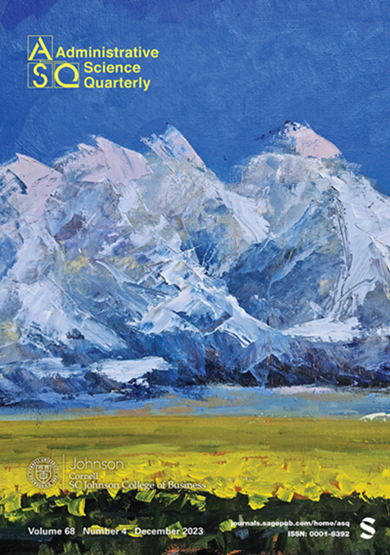Recognition Killed the Radio Star? Recognition Orientations and Sustained Creativity After the Best New Artist Grammy Nomination
IF 6.5
1区 管理学
Q1 BUSINESS
引用次数: 0
Abstract
Many organizations rely on group work to generate creativity, but existing research lacks theory on how groups’ responses to recognition for creative achievement shape their subsequent creative outcomes. Through an inductive study of bands nominated for a Best New Artist Grammy from 1980 to 1990, we develop a theory of reactions to early recognition in creative groups. Our multi-method analyses include oral histories from members of each band and quantitative data, which we use to triangulate the processes they describe. Our findings reveal that groups developed sets of emergent reactions and active adjustments to the recognition and its consequences, which we call “recognition orientations.” We identify three such orientations—absorbing, insulating, and mixed—that reflect how groups interpret recognition and integrate it into their subsequent processes. Most groups struggled by absorbing recognition, which led to internalizing expectations and opening their relationships to outsiders, ultimately inhibiting creativity. Some groups began to insulate themselves from recognition by externalizing expectations and bounding relationships, allowing them to sustain creative output over time. Finally, other groups developed a mixed orientation, initially experiencing the pitfalls of elevated recognition-seeking but ultimately attempting to insulate their need for external recognition by refocusing on their creative process. These findings reveal that recognition can upend the creative process, and groups that begin absorbing recognition are, ironically, less likely to earn it again in the future. Filling a critical research gap on creative production among groups that intend to continue working together, the results distinguish the skills needed to manage recognition from those needed to generate creativity, and offer insight into how groups enact longevity.认可扼杀了广播之星?格莱美最佳新人奖提名后的认可取向和持续的创造力
许多组织依靠团队工作来产生创造力,但现有的研究缺乏关于团队对创造性成就的认可的反应如何影响他们随后的创造性成果的理论。通过对1980年至1990年获得格莱美最佳新人奖提名的乐队的归纳研究,我们提出了一个关于创意团体对早期认可的反应的理论。我们的多方法分析包括每个部落成员的口述历史和定量数据,我们使用这些数据对他们描述的过程进行三角测量。我们的研究结果表明,群体对识别及其后果产生了一系列紧急反应和积极调整,我们称之为“识别取向”。我们确定了三种这样的取向——吸收、隔离和混合——它们反映了群体如何理解认可,并将其整合到随后的过程中。大多数群体都在努力吸收认可,这导致了内化的期望,并向外界开放了他们的关系,最终抑制了创造力。一些群体开始通过外化期望和约束关系来将自己与认可隔离开来,使他们能够长期保持创造性产出。最后,其他群体形成了一种混合取向,最初经历了寻求认可的陷阱,但最终试图通过重新关注他们的创作过程来隔离他们对外部认可的需求。这些发现表明,认可可以颠覆创意过程,具有讽刺意味的是,开始获得认可的团队在未来不太可能再次获得认可。这项研究填补了一个关键的研究空白,研究对象是那些打算继续合作的群体,它们之间的创造性产出。研究结果将管理认可所需的技能与产生创造力所需的技能区分开来,并为群体如何实现长寿提供了洞见。
本文章由计算机程序翻译,如有差异,请以英文原文为准。
求助全文
约1分钟内获得全文
求助全文
来源期刊

Administrative Science Quarterly
Multiple-
CiteScore
20.50
自引率
3.80%
发文量
49
期刊介绍:
Administrative Science Quarterly, under the ownership and management of the Samuel Curtis Johnson Graduate School of Management at Cornell University, has consistently been a pioneer in organizational studies since the inception of the field. As a premier journal, it consistently features the finest theoretical and empirical papers derived from dissertations, along with the latest contributions from well-established scholars. Additionally, the journal showcases interdisciplinary work in organizational theory and offers insightful book reviews.
 求助内容:
求助内容: 应助结果提醒方式:
应助结果提醒方式:


